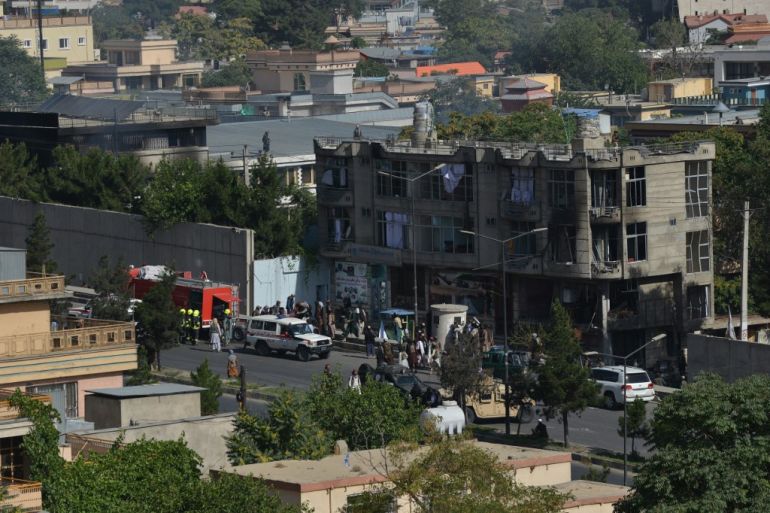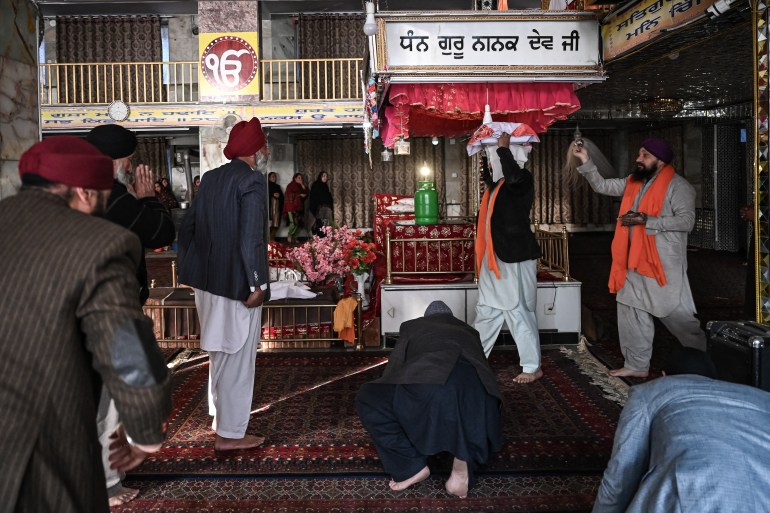Deadly attack on Sikh temple in Kabul leaves community in fear
Years of persecution and conflict have forced many Afghan Hindus and Sikhs to flee the country, seriously reducing the size of their communities.

A member of Afghanistan’s Sikh community has appealed to the international community to help protect religious minorities in the country following an attack on the Karteparwan Gurudwara – a Sikh temple – in Kabul that left at least two dead and three injured.
The Taliban said in a statement that a car laden with explosives was prevented from entering the temple complex on Saturday and detonated before it reached the intended target.
Keep reading
list of 4 itemsHe was a renowned comedian, Taliban threat forced him into exile
Indian officials hold first talks with Taliban in Afghanistan
Afghanistan rocked by series of explosions, 11 killed
A spokesman for the commander of Kabul’s security forces said one Sikh worshipper was killed and a Taliban fighter also died during an operation to clear the temple of attackers, according to news reports.
Details of Saturday’s attack, along with photos and videos of victims and survivors, were shared with Al Jazeera by Sikh community members in Kabul and living in exile abroad.
Witnesses living close to the temple said they heard and felt the impact of the massive blast, which was followed by automatic gunfire as attackers entered the Gurudwara.
“I live close to the Gurudwara and was just getting ready for the day when I felt the loud explosion. I have never before felt anything so strong,” a Sikh resident of Kabul, who only wished to be identified as Anita, told Al Jazeera.
![A Taliban fighter stands guard in front of the Sikh temple in Kabul following an attack by gunmen on June 18, 2022 [Sahel Arman/AFP]](/wp-content/uploads/2022/06/000_32CQ6DZ.jpg?w=770&resize=770%2C514)
Anita is among the estimated 140 Hindus and Sikhs that still remain in Afghanistan; a community that once numbered approximately 200,000 members in Afghanistan in the 1970s.
Years of religious persecution and conflict have forced many Afghan Hindus and Sikhs to flee the country, reducing their numbers to about 7,000 by 2016, and now to a mere 140 who have chosen to remain since the Taliban takeover of the country in August 2021.
In 2020, an attack by the ISIL (ISIS) armed group on a 400-year-old Gurudwara in Kabul left 25 dead and triggered a new exodus of Sikhs from the country.
‘Killed for our faith’
“Once again, we are sharing the terrible news of another attack on the Sikh community in Afghanistan,” said Charan Singh Khalsa, an Afghan Sikh and Hindu community leader now living in exile but who maintains close connections to the community in Kabul.
Khalsa said there were about 30 people inside the Gurudwara when the attack took place on Saturday and nearly all of them managed to escape with few injuries.
“About eight people were caught inside; one of them was killed … while [the] rest were injured. We are waiting for news on their situation. Please pray for their wellbeing,” he said, describing how gunmen stormed into the Gurudwara after a bomb exploded at the gate of the temple.
Sardar Savinder Singh Ghazneci, a devotee who lived at the Gurudwara, was among those killed along with a guard who was stationed at the gate, Khalsa said.
“Sardar Ghazneci was a devotee who volunteered at the Gurudwara and was living there when the attack happened. He was shot by a gunman that entered the Gurudwara after the first explosion,” Khalsa said.
The victim’s whole family had migrated to India after the Taliban takeover last year fearing persecution from the armed group.
“He stayed back to protect their business and serve the Gurudwara. His loss is felt tremendously by the community,” said Khalsa, who appealed to the international community to take note of the injustices against Afghan Sikhs and Hindus.
“We have been repeatedly targeted by different groups, killed for our faith and loyalty to Afghanistan. Why then, after so many attacks, the world remains silent to our plight?” he asked.
“I plead to nations, especially those who have Sikh and Hindu in their governments, like Canada, UK and India, please don’t ignore the misery of our brothers and sisters,” he said.
“There are special programs for Afghans at risk, but none of them highlights the threats to our community. Why does the world ignore our pain?”
‘Things are getting worse’
There has been an uptick in attacks on Afghanistan’s religious minorities, including on Hazara Shia Muslims, and Sufi Muslims. Most of these attacks have been claimed by the Islamic State Khorasan Province, ISKP (ISIS-K), the regional branch of ISIL.

The target of Saturday’s attack, the Karteparwan Gurudwara, was the only operational Sikh temple in Kabul of the four Gurudwaras in Kabul, Anita told Al Jazeera.
“Many people were living inside the Gurudwara since the Taliban takeover to be close to the community. Even the Sardar [Ghazneci] who was killed lived there after his family left,” she said.
“The Taliban assured the Sikhs they won’t hurt us, people felt safer living together in the Gurudwara. Who would have imagined such an attack would happen again?”
Most of Anita’s family have also migrated to India after losing family members to repeated attacks on Afghanistan’s Sikh and Hindu communities.
She, too, had considered leaving the country after the Taliban takeover last year.
“I had stayed back to look after our house, but things are getting worse,” Anita said.
“I was supposed to go to join my family in India, but I haven’t been able to get a visa,” she said, adding that the attack had now strengthened her resolve to leave her beloved homeland – Afghanistan.
“We have to leave if we must survive,” she said, choking back tears.